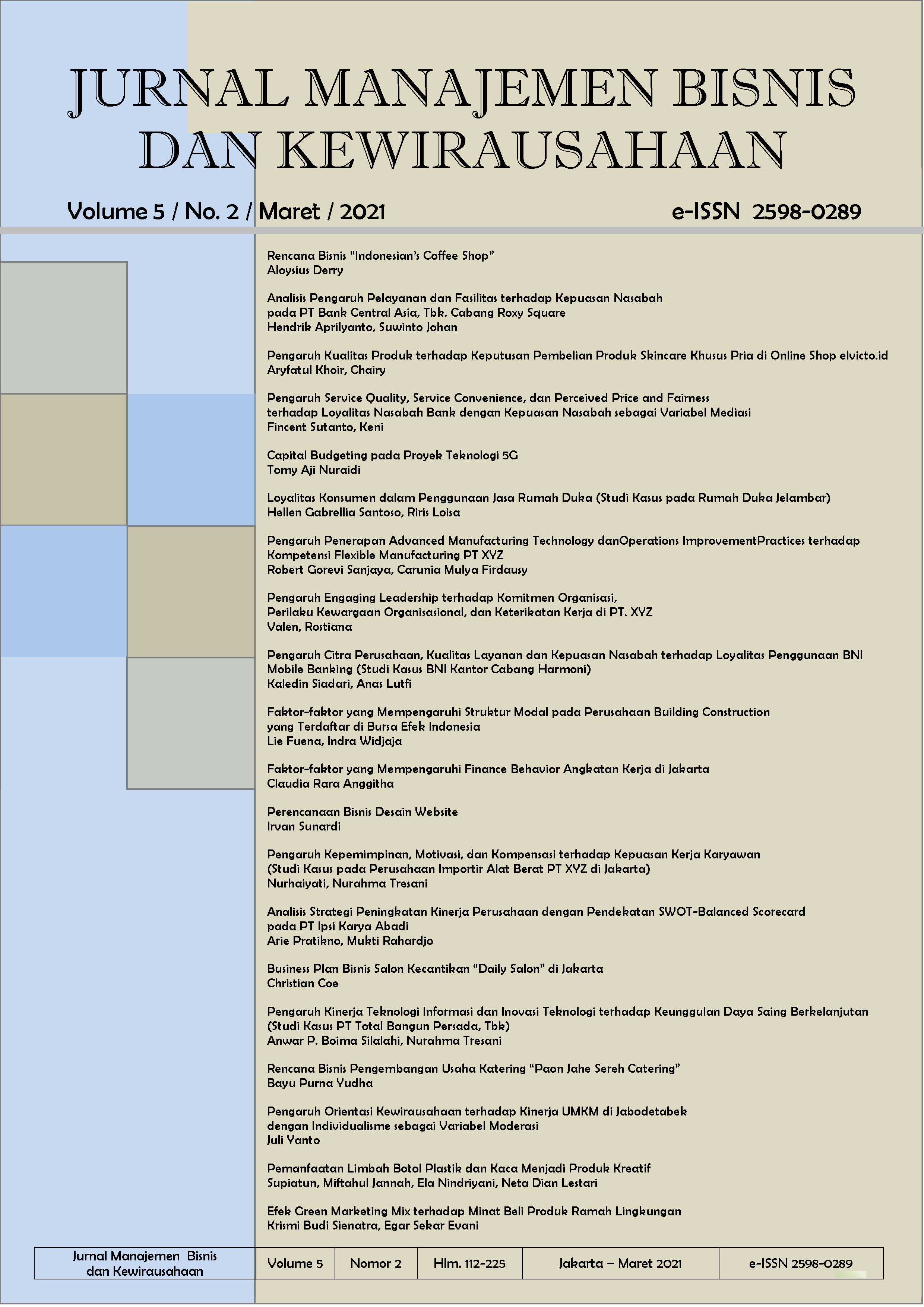Pengaruh Penerapan Advanced Manufacturing Technology dan Operations Improvement Practices terhadap Kompetensi Flexible Manufacturing PT XYZ
Main Article Content
Abstract
The development of the manufacturing nowadays has become very dynamic, as companies are required to be more flexible in order to maintain the sustainability of their business. However, this requirement has not been fulfilled by PT XYZ. Due to this reason, this study aims at examining whether 1) the Advanced Manufacturing Technology (AMT) has a positive effect on Flexible Manufacturing Competency (FMC); 2) the Operations Improvement Practices (OIP) has a positive effect on Flexible Manufacturing Competency (FMC); 3) the AMT can mediate the effect between OIP and FMC; and 4) the OIP can moderate the influence between AMT and FMC. Primary data were obtained from distributing questionnaires to 112 head of department and senior staff of PT XYZ, which were selected by purposive sampling to employees who were directly related to the production process. Data processing techniques used was partial least square (PLS) analysis which processed through the smartPLS 3 program. The results showed that 1) the AMT variable had a positive effect on FMC 2) the OIP variable had a positive effect on FMC 3) the AMT variable mediated the effect between OIP and FMC, and 4) the OIP variable moderated the effect between AMT and FMC.
Perkembangan dunia manufaktur saat ini sudah menjadi sangat dinamis. Akibatnya perusahaan dituntut untuk dapat lebih fleksibel agar dapat menjaga keberlangsungan bisnisnya. PT XYZ merupakan perusahaan otomotif (roda dua) yang belum sepenuhnya memperhatikan kompetensi fleksibilitas manufaktur (FMC). Oleh karena itu, studi ini bertujuan menguji apakah 1) Advanced Manufacturing Technology (AMT) berpengaruh positif terhadap FMC; 2) Operations Improvement Practices (OIP) berpengaruh positif terhadap FMC; 3) AMT dapat memediasi pengaruh antara OIP dan FMC; serta 4) OIP dapat memoderasi pengaruh antara AMT dan FMC. Data primer diperoleh dari pembagian kuesioner kepada 112 kepala bagian dan staff senior PT XYZ, yang dipilih secara purposive sampling yaitu kepada karyawan yang berkaitan langsung dengan proses produksi. Teknik pengolahan data menggunakan analisa partial least square (PLS) yang diproses melalui program smartPLS 3. Hasil penelitian menunjukkan bahwa 1) variabel AMT berpengaruh positif terhadap FMC 2) variabel OIP berpengaruh positif terhadap FMC 3) variabel AMT memediasi pengaruh antara OIP dan FMC, serta 4) variabel OIP memoderasi pengaruh antara AMT dan FMC.
Article Details
Section
This work is licensed under a Jurnal Manajemen Bisnis dan Kewirausahaan Creative Commons Attribution-ShareAlike 4.0 International License.
How to Cite
References
Becker J. M., (2006, 28 Maret). Re: PLS 3- Choosing options for Moderators. Diakses pada 30 Maret 2020, dari https://forum.smartpls.com/viewtopic.php?t=15405
Ghozali, I., & Latan, H. (2015). Partial Least Squares Konsep, Teknik, dan Aplikasi Menggunakan Program SmartPLS 3.0 Untuk Penelitian Empiris (2nd ed.). Semarang, ID: Badan Penerbit Undip.
Hadi, N. U., Abdullah, N., & Sentosa, I. (2016). Making sense of mediating analysis: A marketing perspective. Review of Integrative Business and Economics Research, 5(2), 62.
Preacher, K. J., & Hayes, A. F. (2008). Asymptotic and resampling strategies for assessing and comparing indirect effects in multiple mediator models. Behavior Research Methods, 40(3), 879-891.
Vita, R. O. (2018). Integration of industry 4.0 and lean manufacturing and the impact on organizational performance.
Zhang, Q., Vonderembse, M. A., & Cao, M. (2006). Achieving flexible manufacturing competence. International Journal of Operations & Production Management, 26(6), 580-599. doi:10.1108/01443570610666957


